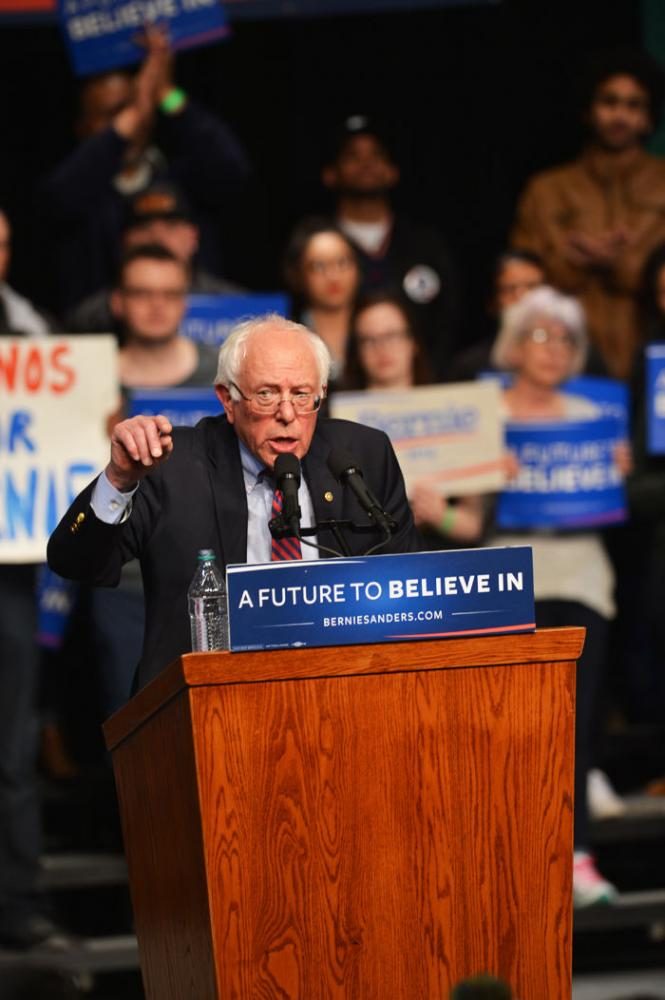Despite voice of Washington voters, elected officials support Clinton
Presidential candidate Bernie Sanders speaks at a rally at the Spokane Convention Center on March 24.
March 30, 2016
Even as Republicans toil over methods of bureaucratic bait-and-switch to rig the nomination process against the will of the electorate, envy is evident from the Republican politician class as they watch the effortless coercion of the Democratic race.
Washington state’s Democratic caucus took place Saturday, when Whitman County threw 80 percent of its support behind Bernie Sanders, a more liberal stance even than the general state’s support of 73 percent. Due to the three-tiered caucus system of Washington, only about a third of its delegates have been assigned — though barring any bureaucratic trickery the remaining 67 votes will be cast proportionately. The popular vote in any state is translated into pledged delegates, elected civilians who represent voters at other forms of caucuses until the National Convention this July.
Without superdelegates, a class of delegates not elected but rather appointed by the Democratic National Committee, the delegate count is currently at 25-9 in Bernie Sanders’ favor, but with 10 of 17 Washington superdelegates supporting Clinton, the delegate count is suddenly 25-19. If the other seven declared in favor of Clinton, she would actually be leading in Washington delegates, despite having lost the state by a vast majority. With only one tier of the caucus system accounted for, 17 people have as much sway in the nomination process as every voter who caucused in King County Saturday.
This is democracy as espoused by the Democratic Party?
The majority of Washington superdelegates are in elected positions, such as Governor Jay Inslee, Senator Patty Murray and Representative Rick Larsen, and every avenue of social media with their names on it has been flooded with demands from their constituents to respect their vote. Inslee posted domestic Easter photos of his family only to have the comment feed swamped with calls for the governor to switch his vote. Some went further, adding the context of the governor’s recent bulk veto of bills — including a bill that would have homogenized disability amenities at state colleges and universities to ease the transfer process — and called for the governor to step down.
Inslee, at least, will likely shift his vote if Senator Sanders manages, against all odds, to nab the majority of pledged delegates nationally.
“(Superdelegates) have never decided the presidential nomination. They’re not meant to be a check on the will of the people and they’ve never acted that way,” said Jamal Raad, a representative for the Washington State Democratic Party and acting press liaison for Inslee.
When asked before the caucus whether the state’s results would specifically affect the governor’s final decision as an elected official of the state rather than on the national stage, Raad’s answer was somehow both curt and circumspect.
“(Inslee) supports Hillary Clinton,” said Raad.
When asked again after the overwhelming election results in favor of Sanders whether the choice of the constituency affected the governor’s decision-making, the answer was identical.
“Governor Inslee supports Hillary Clinton.”
“We’re convinced that the superdelegates in Washington and other states eventually will do what’s in their own best interests,” said Michael Briggs, communications director for the Sanders campaign, “and support the candidate who has the most enthusiasm, the most excitement, the most backing of the young people who are the future of the party and the candidate who, in poll after poll, has the best chance to defeat Donald Trump or any of the other remaining Republican White House hopefuls.”
It remains to be seen which if any of Washington’s elected officials will indeed be swayed before the National Convention. Others will certainly take the political backseat that the governor has taken, only committing to support his constituents if he can hide amid national results, unless public response shifts the political arithmetic.
Yet, one could almost excuse the governor and others for lousy representation when taking into account the response of Larsen, who has flatly refused to represent his constituency even under politically convenient circumstances.
“I continue to support Hillary Clinton in the race for President,” reads a statement from Larsen. “While I recognize the win of the Sanders campaign on Saturday, I will cast my vote for Hillary at the Democratic National Convention in July.”
This came in part as a response to an outpouring of dissent from Washington residents, though instead of appeasing the consternation of the Washington electorate, the last few days have seen an exponential amount of growth in media interest for Mike Lapointe, an activist and challenger to Larsen’s seat in Congress. Lapointe is currently challenging Larsen to a public debate, something Larsen neglected to do the last time Lapointe challenged him. Following a political season with titan clashes of pragmatism and populism, the activist challenger would likely be primed to ride the Bernie wave into office.
Lapointe has seized the momentum of the moment to align himself with Sanders’ liberal platform, seeming to coin a term reminiscent of Reagan Democrats with an unknown half-life.
“If the revolution is to succeed, and Bernie is to get through Congress the things he wants to get done, we must all work together to elect Bernie Democrats,” wrote Lapointe.








